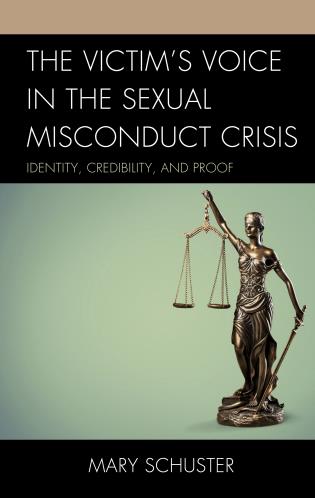The Victim's Voice in the Sexual Misconduct Crisis: Identity, Credibility, and Proof

Mary Schuster's new book, The Victim's Voice in the Sexual Misconduct Crisis: Identity, Credibility, and Proof, is now available.
From the publisher: "The Victim’s Voice in the Sexual Misconduct Crisis investigates how a victim’s voice, identity, credibility, and proof are challenged or established in the current sexual misconduct crisis. Using communication and rhetorical analysis, gender studies, and law and society perspectives, Mary Schuster examines concerns such as victim impact statements offered in sentencing hearings of convicted offenders, due process and Title IX requirements in campus sexual assault investigations, and laws and Title VII standards governing workplace sexual harassment complaints. Schuster also analyzes the testimony offered in the 1991 and 2018 U.S. Senate Judiciary Hearings regarding the Supreme Court nominations of Clarence Thomas and Brett Kavanaugh, social movements such as #Me Too, and global activists’ efforts to challenge gender stereotypes and hierarchies. This book argues that we cannot outlaw or legislate away sexual misconduct, but must instead focus on cultural, social, and systemic changes in order to change the current climate. Moreover, the author argues for zero tolerance for sexual misconduct, but recommends a gradation of punishment or sanctions for offenders, offering examples of successful educational and therapeutic efforts to alter misconceptions regarding sexual misconduct. Scholars of gender studies, communication, legal studies, and rhetoric will find this book particularly useful."
— Elizabeth Britt, Northeastern University


